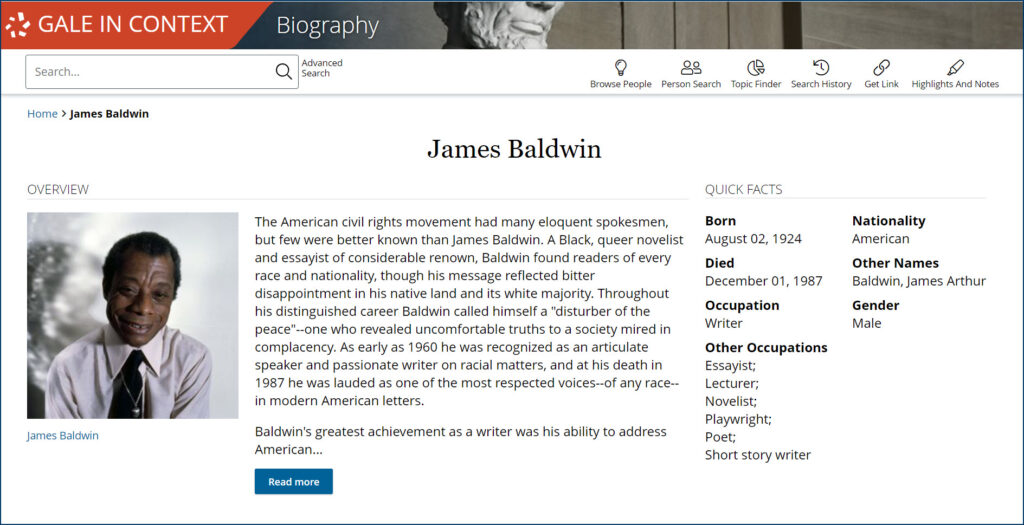| By Gale Staff |
James Arthur Baldwin was born on August 2, 1924, into a nation grappling with Jim Crow and at the cusp of the Harlem Renaissance. This future literary luminary and passionate activist found himself thrust into a crucible of poverty, racism, and tempestuous social change. Rather than sinking under that heavy burden, Baldwin rose to become one of the most celebrated intellectuals and activists of the Civil Rights Movement.
As we observe Baldwin’s 100th birthday, the occasion calls for reflection on his enduring legacy as both a literary tour de force and social commentator during a time of great upheaval. He tapped into a seemingly infinite well of talent as an essayist and storyteller to articulate the struggles and aspirations of African Americans, leveraging his raw, piercing honesty with a penchant for lyrical beauty.
Baldwin’s works serve as a gateway for students to explore the intersection of societal expectations and race while honoring Baldwin’s ability to illuminate the human condition as a means of inspiring action.
With Gale resources at your fingertips, your students have the academic support to dig deep into Baldwin’s writing. Gale In Context: High School, Gale In Context: Biography, and Gale In Context: Literature bring Baldwin’s writing to life, providing illuminating context and helping students reach a higher level of understanding.
James Baldwin’s Early Years
“Anyone who has ever struggled with poverty knows how extremely expensive it is to be poor.”
– No Name in the Street
To understand James Baldwin’s work, students must first gain perspective into the formative experiences that shaped his voice. Gale In Context: Biography features a James Baldwin topic page that combines authoritative reference content with periodicals and multimedia, including his 1970 interview “On Violence and Racism” and a broadcast recording from NPR’s All Things Considered regarding personal correspondence with Nina Simone.
Baldwin’s childhood and early adulthood in Harlem were challenging, both economically and spiritually. As the eldest of nine children, he bore a backbreaking burden of responsibility, helping his mother raise his siblings in a home under the thumb of a strict, fervently religious stepfather. He sought refuge in the written word, kindling a love for literature that inspired him to become a writer.
At only 14, Baldwin found himself drawn deeper into his faith, even becoming a junior preacher giving full sermons at the Fireside Pentecostal Assembly. Baldwin recalled that time, “Those three years in the pulpit – I didn’t realize it then – that is what turned me into a writer, really, dealing with all that anguish and that despair and that beauty.” As he continued to develop his writing style, he often drew on his experiences of the “fiery language and dire warnings” of evangelical sermons to lend his works a lyricism that seems to encapsulate his abilities as an author.
After graduating from high school in 1942, Baldwin sought work in the wartime industry to bring more money into his household. He found a factory job in Belle Meade, New Jersey, where he came face-to-face with racism and hostility from white workers. After his stepfather’s death, the future author quit his job, moved to Greenwich Village, and set about writing his first novel.
In 1944, Baldwin met author Richard Wright, who helped him obtain a fellowship to pursue his passion for literature. With it came his first published works in the periodicals Nation, the New Leader, and Commentary. As Baldwin’s lifelong mentor, Wright offered support, networking opportunities, and eventually, a grant to travel to Paris.
A Parisian Exodus
“Once you find yourself in another civilization, you’re forced to examine your own.”
– Baldwin on his time in France
After 24 years of facing the daily hardships of racism and pervasive threats of violence against the black community, Baldwin was deeply troubled. This oppression stifled his creativity and intellectual pursuits. In pursuit of broader horizons, Baldwin accepted a grant that Wright had helped secure for him, seeking anonymity and freedom in Paris.
This self-imposed exile sparked Baldwin’s creative awakening, as he now found himself surrounded by a melting pot of black artists, intellectuals, and litterateurs. Like him, they, too, had sought relative freedom in the city. His writings from this period offer a window into the soul of a man wrestling with the complexities of race and identity. He penned many of his early works during his time there, including his first novel, Go Tell It on the Mountain, and essays that would later be compiled into Notes of a Native Son.
His time in Paris was also an opportunity to become more familiar with himself, a fact that he eloquently summarized in a 1985 interview with the New York Times: “Once I found myself on the other side of the ocean, I could see where I came from very clearly, and I could see that I carried myself, which is my home, with me. You can never escape that. I am the grandson of a slave, and I am a writer. I must deal with both.”
The Civil Rights Movement
“What is it you want me to reconcile myself to? . . . You always told me it takes time. It has taken my father’s time, my mother’s time, my uncle’s time, my brothers’ and my sisters’ time, my nieces’ and my nephews’ time. How much time do you want for your ‘progress’?”
– From the documentary James Baldwin: The Price of the Ticket
As the Civil Rights Movement gained momentum, Baldwin felt drawn back home to join the cause. He took a position with the Congress of Racial Equality and embarked on a speaking tour, challenging listeners to confront the immorality of racism. His powerful orations and writings expressed his vision for a more equitable society free of discrimination and segregation.
One particularly impactful speech occurred in 1965 at Cambridge University during a debate with William F. Buckley, Jr., the editor of The National Review. With 600 undergrads in attendance, he laid out his argument that the “American Dream had come to fruition on the backs of enslaved people—that primarily free labor during slavery and the ‘Negro’s’ cheap labor in ensuing years served as the economic foundation of the United States.” He won the day, with 544 of the students present finding Baldwin more compelling than Buckley and even giving him a standing ovation.
Underscoring his prominence in the Civil Rights Movement, the World Council of Churches Fourth Assembly in Uppsala, Sweden, invited Baldwin to address the assembly in the place of Martin Luther King, Jr., who had been assassinated earlier that same year.
Bringing Baldwin’s Works Into the Modern Classroom
“Those who say it can’t be done are usually interrupted by others doing it.”
– Notes of a Native Son
In his later years, Baldwin continued his work as both an advocate for social justice and a skilled writer. He spent much of his time in the south of France but never gave up his American citizenship. He considered himself a “Transatlantic commuter,” frequently returning to the United States to participate in the Civil Rights movement.
On December 1, 1987, Baldwin passed away in France, leaving behind a legacy that still resonates with readers today. Introducing students to his work opens new doors to the perspectives and emotions of a man who felt deeply about the state of the world and took his role in changing it very seriously.
Gale In Context’s compilation of multimedia resources and educator-vetted reference articles are invaluable for engaging learners in challenging texts such as “Sonny’s Blues” and If Beale Street Could Talk. With the support of these topic pages, plot summaries, critical analyses, and related readings, students can reflect on and better appreciate Baldwin’s work as both a literary savant and an advocate for equality.
Additionally, thanks to the platform’s built-in tools, such as text-to-speech and on-page translations, educators can better meet diverse learning needs. To explore these resources further or to request a free trial, please contact your local sales representative.


